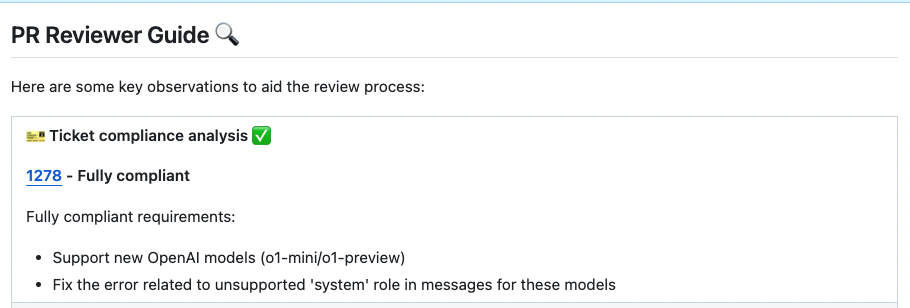Ticketing Integrations
Git Integration (formerly Qodo Merge) – AI code review agents for pull requests. This documentation describes the Qodo v1 experience. For the Qodo v2 documentation, click here.
Platforms supported: GitHub, Jira, Linear, Azure DevOps
Qodo enhances the code review process by integrating with your ticket management system. It automatically surfaces relevant ticket data alongside code changes, helping reviewers understand the intent behind a pull request.
Ticket data fetched
The table below shows which ticket fields are fetched and used by Qodo for ticket context and compliance, per provider.
Jira
✔
✔
✔ (customfield_*)
✔
✔*
✔ (≤3 images)
✔
Linear
✔
✔
✖
✔
✖
✔ (≤3 images + embedded)
✔
Azure DevOps
✔ (System.Title)
✔ (System.Description)
✖
✖
✔ (dedicated field)
✖
✔ (System.Tags)
Monday.com
✔
✔
✔ (long_text cols)
✔
✖
✖
✔
GitHub Issues
✔
✔
✖
✔
✖
✖
✔
GitLab Issues
✔
✔
✖
✔
✖
✖
✔
* Acceptance criteria in Jira is supported only when stored in a custom field.
Ticket Recognition Criteria
A ticket is linked to a PR if:
The PR description contains a direct link to the ticket, or
The branch name matches an accepted ticket reference pattern (see accepted syntax for details)
Accepted syntax
Jira
PROJ-123
proj-123
feature/PROJ-123
feature/PROJ-123/add-new-feature
feature/PROJ-123-add-new-feature
fix-PROJ-123-bug
TSAASO-3250-cluster-labels
ABC-5678_v2
[PROJ-123]-hotfix
release-v1.2-PROJ-123-impl
bugfix-abc-456-fix
PROJ123
P-123
PROJ1-123
VERYLONGPROJECT-123
PROJ-12345678
Linear
PLT-2837
plt-2837
plt-2837-be-rename-env-file
A1B2-456
feature/PLT-2837
feature/PLT-2837-add-feature
release/v1.2/PLT-2837
hotfix/ABC-123/urgent
fix-PLT-2837
bugfix_PLT-2837
feature-PLT-2837-bug
[PLT-2837]
PREFIX/feature-PLT-2837
Notes:
Branch-based detection is always enabled
Supported patterns are fixed in production and cannot be configured
Matching is case-insensitive
The ticket ID must appear at the start of the branch name or immediately after a
/
Tool Behavior
Describe tool
When a ticket is recognized, the describe tool includes ticket content (title, description, labels) in its analysis. This provides the model with additional context for understanding the purpose behind the code changes.
Review tool
The review tool also incorporates ticket context into its analysis. Additionally, it evaluates whether the PR aligns with the ticket’s intent, assigning one of the following labels:
Fully Compliant: PR directly addresses the ticket requirements
Partially Compliant: PR covers some but not all of the requirements
Not Compliant: PR does not align with the ticket’s intent
PR Code Verified: Code appears valid for the ticket, but additional manual testing (e.g., UI checks across devices) is required

Configuration Options
By default, the tool will automatically validate if the PR complies with the referenced ticket. If you want to disable this feedback, add the following line to your configuration file:
You can also set:
When enabled, Qodo will check that all code changes are related to the ticket. If unrelated content is found, the PR will be downgraded (e.g., to PR Code Verified), and a comment will indicate the extra content. The default is false.
Last updated